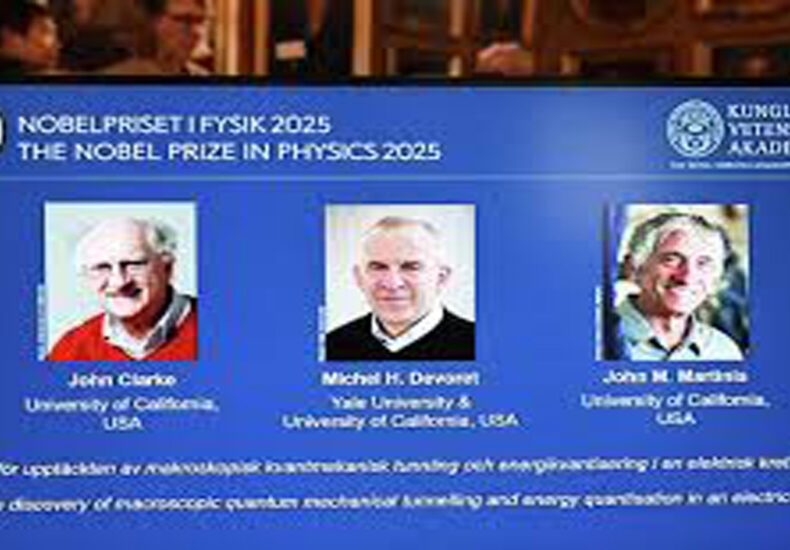
Three U.S. Scientists Win 2025 Nobel Prize in Physics for Quantum Breakthroughs
Fundacion Rapala – Three American scientists — John Clarke, Michel Devoret, and John Martinis — won the 2025 Nobel Prize in Physics for their pioneering research linking quantum mechanics to digital technology. Their experiments revealed how quantum effects influence ordinary materials, creating a foundation for the next generation of computing and communication systems.
Clarke, a professor at the University of California, Berkeley, admitted he was stunned by the recognition. “I’m completely shocked. I never imagined this research could lead to a Nobel Prize,” he said during a press conference, quoted by Reuters.
Quantum Mechanics Beyond the Microscopic Scale
Quantum mechanics, over a century old, traditionally focuses on the smallest scales of nature — atoms and subatomic particles. Its principles often seem counterintuitive when compared to classical physics. Yet, Clarke, Devoret, and Martinis proved that quantum behavior also occurs in superconducting electronic circuits, which are visible to the naked eye.
Their 1980s experiments demonstrated that quantum principles can extend to larger, engineered systems under precise conditions. This discovery helped bridge the gap between theoretical quantum physics and practical technology.
Read This : Best Diluc Build Guide for Genshin Impact: Weapons, Artifacts, and Team Compositions
The Nobel Committee Highlights the Impact
“This award celebrates how quantum mechanics continues to reshape science and technology even after a hundred years,” said Olle Eriksson, Chair of the Nobel Physics Committee. He noted that quantum mechanics underpins nearly all digital technologies today, from semiconductors to advanced computing.
The Royal Swedish Academy of Sciences emphasized that the trio’s work lays the groundwork for future quantum innovations, including quantum cryptography, quantum computing, and quantum sensing. These technologies could transform how information is processed, secured, and transmitted globally.
The Promise and Challenges of Quantum Computing
Quantum computers harness quantum principles to perform massive calculations at unprecedented speeds. While a traditional computer might take thousands of years to complete certain tasks, a quantum system could finish them in seconds. This immense power makes it valuable for solving global challenges like climate modeling, drug design, and financial simulations.
However, quantum computing still faces hurdles. Scientists are working to reduce errors in quantum chips and enhance their stability. Achieving commercially viable quantum computers remains a work in progress, with experts debating how soon large-scale deployment will be possible.
The Scientists Behind the Discovery
John Clarke, born in the United Kingdom, now teaches at UC Berkeley, where he focuses on superconductivity and quantum magnetometry.
Michel Devoret, a professor at Yale University and UC Santa Barbara, also serves as a leading scientist at Google Quantum AI. His research centers on quantum coherence and circuit design.
John Martinis, an American physicist from UC Santa Barbara, led Google’s Quantum AI Laboratory until 2020. In 2019, his team achieved a major milestone known as quantum supremacy, where a quantum processor outperformed the world’s fastest supercomputer on a specific task.
A Legacy of Scientific Achievement
The Royal Swedish Academy of Sciences awarded the 2025 Nobel Prize in Physics with a total prize of 11 million Swedish kronor (around $1.2 million). Physics was the first category named in Alfred Nobel’s will, symbolizing his belief in science’s ability to change the world. Since 1901, the Physics Nobel has recognized discoveries that deepen humanity’s understanding of nature.
Earlier this week, the 2025 Nobel Prize in Medicine went to two American and one Japanese researcher for their discoveries in immune system regulation. Together, these awards highlight science’s ongoing role in driving innovation and improving lives worldwide.